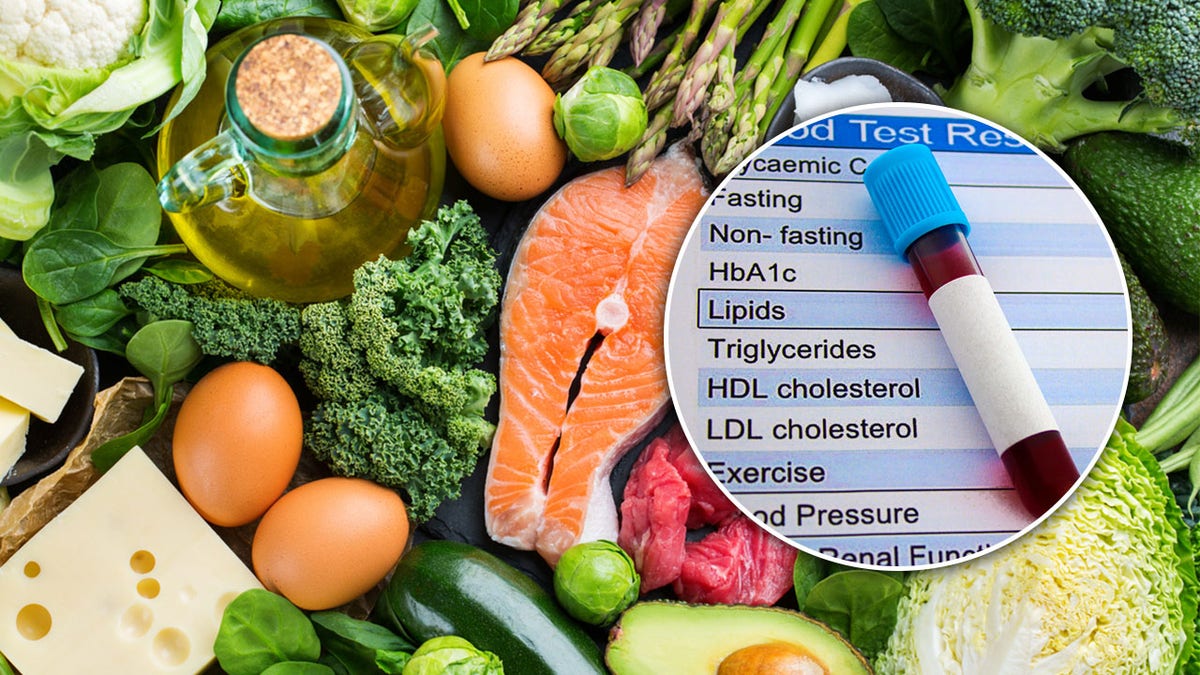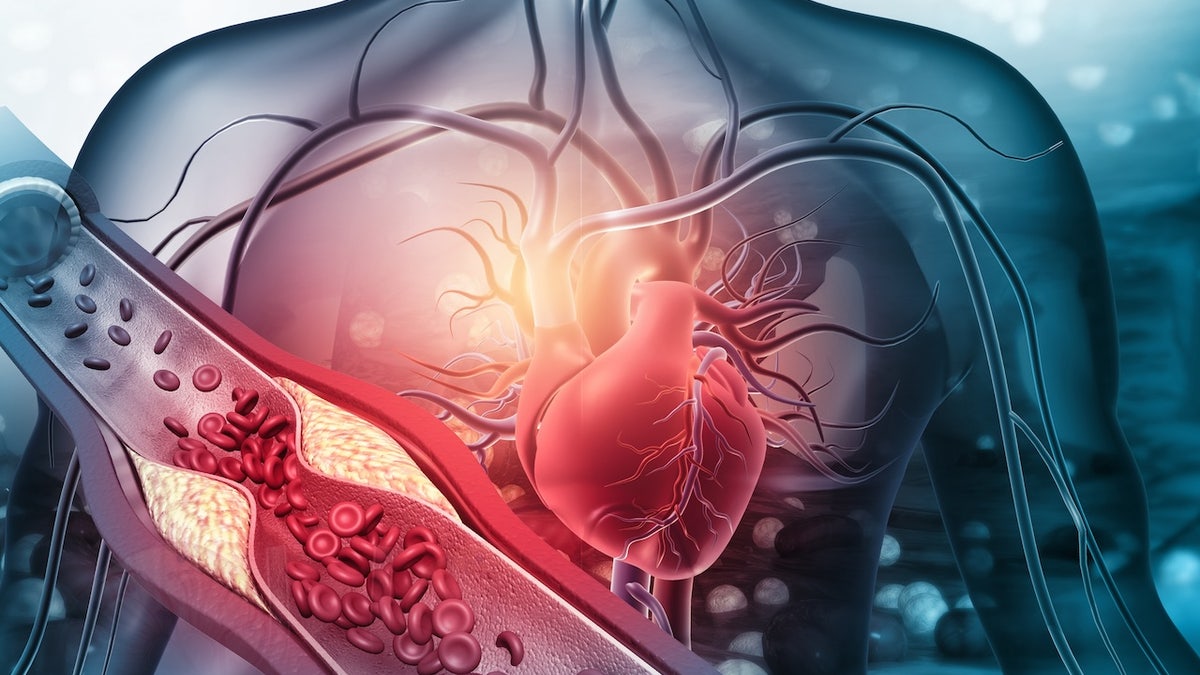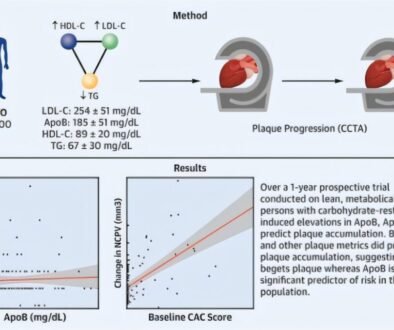Keto diet not linked to a greater risk of heart disease, explains a new study
[ad_1]
High cholesterol has long obtained a bad rap for having caused poor heart health – but a new study suggests that the low -carbohydrate ketogenic diet may not be linked to cardiovascular disease.
The study, led by the Lundquist Institute for Biomedical Innovation at the Harbor-UCLA Medical Center in collaboration with researchers from several institutes, evaluated 100 participants in a long-term keto diet which has developed high levels of LDL cholesterol (known as “bad” type).
In addition to high cholesterol, all participants were “metabolically healthy” and had followed the key diet for an average of five years, according to a press release on April 7.
Higher heart disease risk for women who have these unhealthy lifestyle habits
They have all qualified as LMHR (lean mass hyper-repairing), which indicates people who adopt a restricted carbohydrate diet and feel a significant increase in cholesterol.

High cholesterol has long obtained a bad rap for having caused poor heart health – but a new study suggests that the low -carbohydrate ketogenic diet may not be linked to cardiovascular disease. (Istock)
Using advanced cardiac imagery, researchers have found that traditional cholesterol markers (APOB and LDL-C) were not associated with changes in plaque levels in the arteries of the heart or with a basic heart disease over a one-year period.
Instead, existing plaque levels seemed to be a better predictor of the future accumulation of plates.
“This population of people – metabolically in good health with high LDLs due to ketosis – is not automatically at an increased heart risk simply because their LDL is high,” said Bret Scher, MD, medical director of Baszucki Group, who provided funding for the study, in Fox News Digital.
'I am a heart surgeon and that's what I cook for dinner'
“Therefore, we must probably get away from LDL and Apob and to vascular imaging with CAC or CTA for better risk prediction and informing how or if to treat someone's heart risk factors,” added the California -based doctor.
The study results were published in the Journal of the American College of Cardiology: Advances.

Using advanced cardiac imagery, researchers have found that traditional cholesterol markers (APOB and LDL-C) were not associated with changes in plaque levels in the arteries of the heart or with a basic heart disease over a one-year period. (Istock)
Previous studies have also shown that qualified people as LMHR have similar levels of coronary plaque with comparable groups that have normal LDL levels, “stressing that LDL increases induced by the ketogenic diet may not indicate a higher risk of coronary plaque,” said the researcher.
Dr. Nick Norwitz, a study manager and independent researcher at the University of Oxford, noted that it is the first study to isolate very high LDL and APOB as risk factors for heart disease.
“All other human studies have included populations with metabolic dysfunction or individuals with high LDL genetic causes,” he told Fox News Digital.
8 myths of the carnivorous regime demystified by the researcher
The results seem to contradict what most clinicians have predicted and what doctors are taught in medical training, according to Norwitz.
“Although these data do not prove that conventional understanding is” erroneous “in itself, they suggest that the conventional model has a wide dead angle.”

This is the first prospective trial of gender in a single population often labeled “high risk” by traditional directives, said a doctor, raising important questions about how the cardiovascular risk is evaluated in the context of low -carbohydrate and fat -rich diets. (Istock)
According to Norwitz, cardiac imagery, including a CAC score, has “much more value” than cholesterol levels to predict the progress of the plate.
“Thus, CAC scores can be used to stratify patients' risks and help individualize care,” he told Fox News Digital.
SCHER noted that “ketogenic therapy” can be effective in treating certain conditions related to the metabolic, but some people are afraid of pursuing an keto diet because of their cholesterol.
“This study provides support of which they do not necessarily need to stop the diet or treat their cholesterol-they can rather work with their health care team for a more individualized and more appropriate cardiac assessment,” he advised.
Ask important questions
Dr Ken Berry, family doctor and diabetes In Tennessee, was not involved in research but shared his reflections on what he described as a “revolutionary” study.
“The study did not find any association between LDL-C, APOB and the progression of the coronary plaque over a year using high-resolution CT angiography,” he told Fox News Digital.
“Instead, the strongest predictor of the progress of the plate was the preexisting plate, not the cholesterol levels – the researchers led to conclude that” the plate generates the plate, does not have it. “”

The existing plaque levels seemed to be a better predictor of the future accumulation of the plate, although some experts have warned that there are limits. (Istock)
This is the first prospective trial of gender in a single population often labeled “at high risk” by traditional directives, said Berry, raising important questions about how the cardiovascular risk is evaluated in the context of low -carbohydrate and fat -rich diets.
“The obvious implication is that if very high levels of apob are not a good predictor of the risk of heart attack in this specific group of people, then is this a good predictor in a group of people?” He said.
“Or is it, as I suspect, just the latest popular laboratory test used to scare people far from eating an appropriate human consumption rich in saturated fats?”
Potential study limitations
Dr. Bradley Serwer, cardiologist and chief doctor of Vitalsolution, a cincinnati-based company which offers cardiovascular and anesthesiology services to the country's hospitals, examined the study and underlined certain potential limits.
“The limited scope of the study, involving a short -term population of a short -term risk, makes it difficult to generalize the results to a larger and more vulnerable population,” Fox News Digital said.
Harvard's medical student ate 720 eggs in a month, then shared the “fascinating” results
“Although the objective of the study is to propose a hypothesis concerning the role of food cholesterol, it does not provide final evidence for or against its meaning.”
The cardiologist, however, agrees with the conclusions of the authors that “improve risk stratification tools” are essential to identify individuals at higher risk of coronary disease.

The effects of an ketogenic diet can be measured using an ketosis counter. “I hope doctors will adopt this research and deal with this specific population of people differently from the rest of their patients, including the unique physiological state of ketosis and the metabolic advantages it offers,” said a researcher. (Istock)
“As doctors, our main responsibility is to assess each patient on an individual basis and collaborate with them by shared decision-making to develop the most appropriate long-term care plan,” he added.
Click here to obtain the Fox News app
Michelle Routhenstein, a dietitian recorded in New York, specializing in heart disease, noted that plaques training is a process in several stages that can take years to progress.
“The environment of the artery must be conducive to the formation of plates,” said Routhenstein, who was not part of the study, at Fox News Digital.
“It is a remarkable group of humans demonstrating remarkable physiology.”
“For example, individuals with high blood pressure, a subgroup excluded from the study, are more prone to endothelial damage which can cause deposit more easily in the wall of the artery.”
“If someone already has a plaque in the arteries and supports a high level of LDL and apob, it can develop in a plate, as we have seen in this study.”
Click here to register for our Health Newsletter
“However, if someone is metabolically in good health, has no plaque at the start and has raised the levels of apob and LDL alone, then the environment cannot necessarily cause a plate over a period of one year.”
Routhenstein stressed previous research showing that LDL and APOB raised during the years of someone's life, generally associated with inflammation, resistance to insulin and / or oxidative stress, can increase the risk of plaque development.

“It is important to note that many people who implement a ketogenic diet and ignore the high levels of LDL and Apob generally do not know that they have a mixture with soft plate,” said a dietitian nutritionist. (Istock)
“It is important to note that many people who implement a ketogenic diet and ignore the high levels of LDL and Apob generally do not know that they have a mixture of soft plaque,” she added.
“Consequently, their advisor to ignore the levels of LDL and Apob can be harmful – especially in a world where heart disease is so widespread and remain the main cause of death on a global scale.”
Ahead
Scher said that he hoped that more and more researchers will be inspired to continue this study and apply it to different populations.
“But for the moment, I hope that doctors will adopt this research and deal with this specific population of people differently from the rest of their patients, including the unique physiological state of ketosis and the metabolic advantages it offers,” he said.
For more health items, visit www.foxnews.com/health
In addition to more studies evaluating risk in this population, Norwitz said that the team hopes to deepen the mechanisms of the phenotype of the hyper-repair of lean mass (LMHR).
“This is a remarkable group of humans demonstrating remarkable physiology,” he added.
[ad_2]




